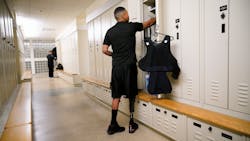CHULA VISTA, Ca. — Former Camp Pendleton Marine Christopher Lawrence is working the beat as a rookie Chula Vista police officer, defying the odds facing military amputees who want to stay in uniform.
There was a dicey moment when Officer Christopher Lawrence jumped a fence to assist a fellow cop on a foot pursuit.
Lawrence, a 31-year-old former Camp Pendleton Marine, only has one foot.
The rookie cop vaulted the fence and landed hard on his prosthetic right leg. Crunch. The metal limb broke under the weight of his gear.
Lawrence thought, “Whoa! I’m going to have to see someone about that.”
It’s been a long road since August 2007, when an Iraqi bomb blew apart his right leg, leading to amputation below the knee.
But, for the past four months, Lawrence has been working the beat as a full-fledged Chula Vista police officer, defying the odds facing military amputees who want to stay in uniform.
“The top things in my life for pride: becoming a Marine, becoming a dad and being a Chula Vista officer,” Lawrence said in a recent interview. “I didn’t think it was going to happen.”
MORE THAN 1,700 AMPUTEES FROM POST-9/11 WARS
It’s a small fraternity of service members who have done it — succeeded in either staying in the active-duty military or translating their skills to civilian law enforcement.
In 2005, Army Capt. David Rozelle became the first military amputee to go back into a combat zone. Last March, double amputee Matias Ferreira was sworn in as a full-service deputy sheriff on Long Island. And, in 2015, Army Sgt. 1st Class Nicholas Lavery became the first Special Forces soldier to return to combat as an above-the-knee amputee.
More than 1,700 service members have lost limbs in the wars in Iraq and Afghanistan since 2001, according to Military Health System figures. A lower-limb amputation became one of the signature injuries of those wars, due to widespread use of hidden roadside bombs by insurgents.
As the Afghanistan war tapered off, 2016 became the first year since 2001 with no combat-related amputations for American troops.
Research suggests that just a trickle remained on active duty. One 2010 study of U.S. soldier amputees found a little more than 16 percent were allowed to stay in the military.
And it’s hard to measure how many found meaningful employment back in civilian life.
But the post-9/11 veterans have fared better than those who lost limbs in the Vietnam War, said Jeffrey Hall, national employment director at Disabled American Veterans.
“We as a society are much further along than 25 years ago, when I started, post-Vietnam. Those veterans were shunned for having a prosthetic leg,” Hall said.
“Now, it’s a badge of honor for a lot of these guys,” he said.
Chula Vista Police Chief Roxana Kennedy said she was silently rooting for Lawrence as he went through the police academy.
“I thought he was so inspiring,” Kennedy said. “I figured if he went through the process, and he could pass all the testing, I’d be more than willing to give him a shot.”
FINDING ANOTHER WAY TO SERVE
Lawrence had detours and roadblocks on his journey to a new uniform.
After his injury, the young Marine faced a terrible decision. He tried walking again after six months in a hospital bed. His foot was shredded — in addition to injuries on the other leg, an arm and internal wounds.
“It was right around my 21st birthday. It was like my foot just … I don’t know how to describe it. It was like a foot, and then it turned into a football. It became this big mass,” Lawrence remembers.
The doctors told him that bones can heal, but soft-tissue damage is complicated.
“They said ‘We could fuse it, and you can have your foot.’ But I’d have to use a walker for the rest of my life, and I wouldn’t be able to stay in the Marine Corps. I’d never be able to run.”
In March 2008, Lawrence made the decision: Cut it off.
But he didn’t stay in the Marine Corps.
The guy who enlisted at age 17 didn’t want to be a behind-the-scenes Marine. And, even if he could return to combat, he worried he would be a liability.
In 2010, Lawrence accepted a high disability rating and was medically retired.
He counseled other young combat veterans for a while, until nonprofit funding ran out. He took some college classes.
But the former Marine was still a young man. That version of life wasn’t satisfying.
REGAINING PHYSICAL CONFIDENCE
Boxing helped him regain some physical confidence. Sparring in the ring, Lawrence realized he could still handle himself.
He went on runs with a friend who was a San Diego cop. One trek stretched out to 8 miles. His buddy said: That’s longer than anything in the police academy.
“I still wanted to do something,” Lawrence said. “I felt I was most useful and most at peace with what I was doing in Iraq — not kicking in doors and all that — but actually going out in the community and helping citizens. We did that over there, too.”
Convincing police departments that he was fit for duty wasn’t so easy.
Lawrence put in applications. Four departments said no.
He got a conditional offer from one law enforcement agency, which would have placed him on the path to a free ride at a police academy.
The last two hurdles were the medical and psychological evaluations. That’s when he got the bad news: Thanks, but no thanks.
“That was heartbreak,” Lawrence remembers.
PROVING HIMSELF, AGAIN
The former Marine made a decision. He’d use his GI Bill to attend Southwestern College’s police academy. It was a gamble: Maybe no one would hire him afterward.
“I was concerned about the physical training side of it,” Lawrence said.
The academy instructor who led the PT sessions was a Chula Vista officer. He became the pace car for Lawrence, who knew that he wasn’t the fastest recruit — but he was damned if he would be the slowest.
“I was hoping that showed him, and the other officers, that my injuries and limitations don’t really limit that much,” the former Marine said.
Specifically, Lawrence ran with a “regular” leg — not a specialized running leg, sometimes called a blade. He, and others, knew that there would be no time during a foot chase to swap out prosthetics.
“It hurt,” said Lawrence, who stands over 6 feet tall and weighs about 200 pounds. “But that’s what I did. I did 11 months like that.”
People noticed. The former Marine got a job offer before he finished the academy in June 2017. He was able to graduate in a Chula Vista police uniform.
“It was surreal,” Lawrence remembers. “I was like, ‘Am I dreaming?’ ”
It was almost exactly 10 years after his injury.
ON THE JOB, IT’S THE BADGE, NOT THE LEG
Now, Lawrence gets up before dawn to drive from Oceanside to Chula Vista for the early morning shift. He puts on a 20-pound bulletproof vest and belt kit. He checks out a police cruiser.
Then he is alone on patrol, responsible for the safety of Chula Vista residents.
The only hiccup so far was the broken foot. And, there was a humbling moment when another cop blew past him during a foot chase. Lawrence realized he needed to train with a weight vest to mimic the bulk of his gear.
The public hasn’t made an issue of his right leg. It’s possible people don’t notice, with his pants and boot hiding the missing portion.
“Most of the time, people are looking at the badge and uniform saying, ‘Thank God you are here to help.’ Or, they are unhappy to see us, because they did something wrong,” Lawrence said.
“So I think the leg is not on the radar. Thankfully.”
———
©2018 The San Diego Union-Tribune
Visit The San Diego Union-Tribune at www.sandiegouniontribune.com
Distributed by Tribune Content Agency, LLC.



